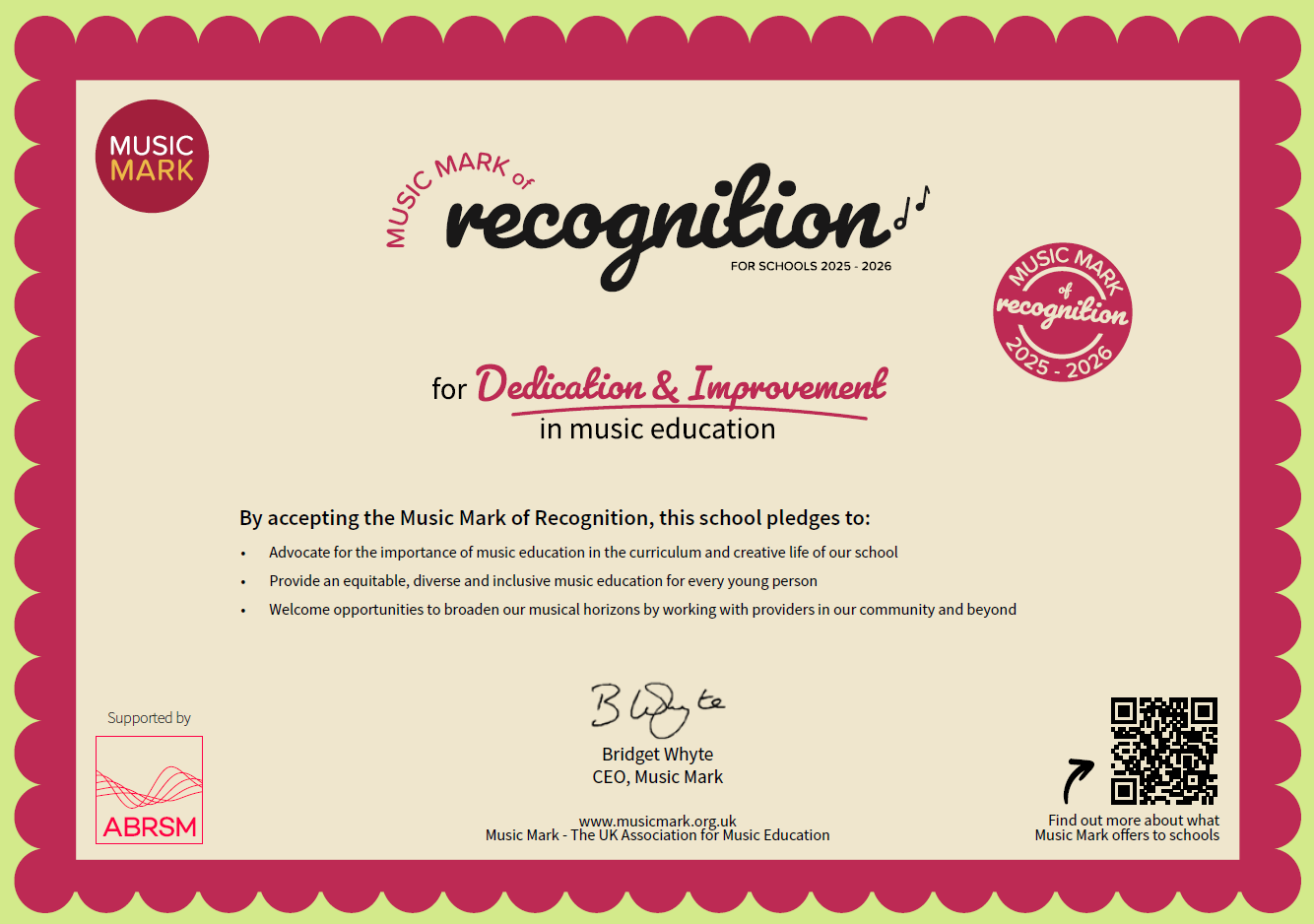

Music Curriculum Statement
Intent
At St Richard’s Primary School we make music an enjoyable learning experience for all. We encourage children to participate in a variety of musical experiences through which we aim to build up their confidence, fluency and accuracy. Our teaching focuses on developing the children’s ability to use their voices expressively and creatively through the singing of songs, speaking chants and reciting rhymes. This facilitates and strengthens the children’s understanding of the structure and organisation of music.
St Richard's Primary School is located in the top 20% of the most deprived areas in England. Due to this our Music curriculum has been personalised and designed to help tackle the effects of deprivation whilst equipping the children with the skills and knowledge they need to succeed. The children are given the opportunity to participate in musical experiences which will enrich and enhance their educational lives.
It is also our intent to promote a love of music through teaching the children to understand musical forms and listen to and appreciate composers past and present.
In addition, St Richard’s aims to develop the children’s use and understanding of technical vocabulary linked to this subject area. This is to ensure that the children can articulate the skills they are developing, talk about any equipment they have used and discuss and compare their musical preferences.
Implementation.
Clear, comprehensive and sequenced lessons, in line with the national curriculum, are taught weekly across school. Through use of the Music Express program, children are given the opportunity to sing, listen, play, perform and evaluate. This is embedded in classroom activities as well as our weekly collective worship assemblies, yearly Harvest, Advent and Lenten assemblies and Christmas and summer productions. These opportunities allow the children to develop their singing and performance skills and increase their auditory memory.
The elements of music that are taught in classroom lessons allow the children to understand and use some of the technical vocabulary of music. This enables them to dissect it, understand how it is made, played, appreciated and analysed.
In year 4, through the Wigan Music service Wider Opportunities programme, children learn to play an instrument. Here specialists strengthen understanding of musical notation and further develop the children’s technical vocabulary. Through an hour long lesson, children are provided with an instrument and given the skills to play with increasing accuracy.
All children have the opportunity to attend extra-curricular activities to support their education, including music. St Richard’s School choir brings together children from across all three key stages and affords them opportunities both in and outside of school.
As a Catholic school, our faith and values are at the centre of all we do. A highlight of the school year are the Walking Nativity and Carol service at St Richard’s Church.
In the Walking Nativity, Children re-enact the journey that Mary and Joseph took on the night that Jesus was born. Traditional carols are a focus of this event.
The yearly Carol Service strengthens links with the local community and allows them to become a part of our school family. The children sing carols and lead the celebration of Christmas.
Children develop their knowledge of local music and the impact that it has had on their locality. Focussing on the Beatles and music from that era, each year group learned and performed a showcase of songs to parents during the school’s annual Celebration picnic day. This was followed by a special concert of music for the children from a Beatles tribute band.
Impact
Whilst in school, children have access to a varied programme, which allows them to discover areas of strength, as well as those they can develop. Through exploration of their opinions and views, and opportunities to perform, they will develop fundamental abilities such as: self-confidence, interaction with and awareness of others, achievement and self-reflection.
Music will also aid development of an understanding of culture and history, both in relation to students individually and different ethnicities from across the world. Children are able to enjoy music in as many ways as they choose- either as listener, creator or performer. They can dissect music and comprehend its parts, fully understanding what music is and how it becomes to be. Children become confident and successful musicians and by the end of KS2 will have an understanding of how to further develop skills less known to them, should they wish to pursue their passion for music throughout their lives.






